What Does Running Out Of Gas Actually Do To Your Car's Engine?
For those of us who've played a game of fuel gauge roulette, the consequences of getting it wrong and lurching to an undignified halt at the side of the road go beyond mere inconvenience. Whether it's through forgetfulness, laziness, or just trying to push the limits, running out of fuel is not something your engine, or other mechanical components, will appreciate.
Gasoline — or petrol in England — is more than just fuel. It also plays an essential role in cooling and lubricating parts of the fuel system. One of the major fuel system components is the fuel pump. This usually sits inside your gas tank and is submerged in gasoline, which it uses both as a lubricant and coolant.
Once the fuel drops below a certain point, the fuel pump begins drawing air along with fuel. This not only plays havoc with the engine's fuel/air mixture, but for serial offenders it can also damage the pump, resulting in a costly repair. How much this depends on the make, model, and year of the vehicle, but a typical replacement will cost between $400 and $600 to replace.
There is also the sludge at the bottom of the gas tank to consider, which is especially true of older vehicles, where there can be a more substantial buildup of debris. When the fuel level is too low, this debris can be picked up by the pump and into the fuel lines and engine. This can cause blockages, affect the performance of the engine, and cause starting issues.
When fuel runs dry, your engine pays the price
The fuel pump is the first component in the fuel system that is likely to suffer the consequences of a low-fuel situation. However, once it starts to run out of fuel and misbehave, the repercussions go beyond this. Starting with the engine, modern engines are tuned and this tuning relies heavily on knowing that a precise amount of fuel is mixed with the perfect amount of air to get the most out of the combustion process. Once the pump starts drawing air along with the fuel, this delicate fuel/air balance is disrupted, and the engine can begin to misfire.
An engine misfire can affect a vehicle's drivability, but it goes deeper. Ultimately, a misfire can cause your engine to overheat and can lead to engine knocking. If serious enough, a misfire can cause damage to the cylinder walls and pistons.
In the worst cases, this can cause an engine to seize completely. Further down, the exhaust system can also be damaged by running out of fuel. More specifically, the catalytic converter can be damaged. A catalytic converter is designed to treat engine emissions and reduce their environmental impact. However, running out of fuel can cause unburnt gasoline to enter the exhaust system, causing the catalytic converter to overheat and potentially fail.
So, the next time your low-fuel light illuminates and you think "just a few more miles," it might be worth reconsidering and pulling into the nearest gas station.

